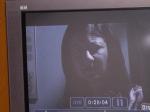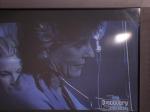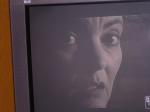by Judith Ford
Actor “Jude” Suffering, dramatization of author Judith Ford in Discovery Health Channel series Mystery ER, photos © 2008 by Judith Ford. All rights reserved.
Last April, when Discovery Health Channel contacted me, I’d been working on my book, Fever of Unknown Origin, for over 15 years. I never intended it to be what it turned out to be—a 600-page manuscript with multiple plotlines and themes. It started out as a way to come to terms with a serious illness that put me in the hospital for most of the summer of 1990.
But while I wrote, my life kept happening. My parents got sick and died; their stories seeped into the book. What I thought and felt about my illness, about illness in general and about death, changed. I did countless rewrites. In 2003, I launched a website, www.judithford.com, expecting I’d be ready to market the manuscript within a year. That didn’t happen. I got discouraged and quit writing more than once, each time returning weeks later with renewed vision, scrapping whole chapters, restructuring and polishing what remained. Fever and I had been alone together too long; I’d lost momentum.
And then I received the Discovery Health Channel email. Bill, a “finder” for the network, found my website. He was looking for stories for a new TV series called Mystery ER. “Yours would be a great story for us,” he told me, “and free publicity for you.”
I didn’t jump at the offer. I’d watched Discovery Health Channel once or twice and knew that it aired stories of real people dealing with dramatic medical issues. I wasn’t sure participating would be good for me or for Fever. I told Bill I’d think it over. He sent me a CD with samples of Mystery ER.
The first opened with a woman having energetic convulsions on an ER gurney. The second involved an orthodox Jewish boy who’d contracted trichinosis, somehow, without ever having eaten pork. He collapsed in an ER doorway. While the stories were presented with respect for the patients and what looked like medical accuracy, I didn’t see how my book would fit. It contained no scenes of me passing out or seizing.
 My illness had developed in slow motion, starting in 1979 with bone-numbing fatigue, low fevers, and an odd prickly rash. I went to doctors who theorized hypoglycemia, spider bites, allergies, chronic mono. None had treatment suggestions, so after two years of feeling like hell, I created my own plan. It included lots of sleep, no refined sugar or white flour, daily lap swimming, dance classes, yoga, and meditation.
My illness had developed in slow motion, starting in 1979 with bone-numbing fatigue, low fevers, and an odd prickly rash. I went to doctors who theorized hypoglycemia, spider bites, allergies, chronic mono. None had treatment suggestions, so after two years of feeling like hell, I created my own plan. It included lots of sleep, no refined sugar or white flour, daily lap swimming, dance classes, yoga, and meditation.
Gradually, I got well and stayed well until 1990, when all the symptoms returned, this time with higher fevers. I also developed anemia, systemic inflammation, and eventually, ulcerative colitis. All dramatic enough to compel me to write but not, I thought, material for a TV show. How could Mystery ER dramatize a fever of 106, an itchy rash, abnormal liver function, and an enlarged spleen? And how in the world could they condense what had become a story about my life into thirty minutes?
“Not to worry,” Nora, the producer, told me. “We’ll just deal with your illness, not the rest of the book, and we’ll write it in a way that’s compelling and authentic.” She offered to come to Milwaukee to interview on camera me, my husband, Chris, and one of my doctors. The show would include clips of our interviews interspersed with dramatizations, played by actors. “And,” said Nora, “we’ll let you mention your book on camera.” It was the promise of book publicity that made me say “Yes.”
 The morning of the filming, the lighting and sound guys took over my friend Judy’s downtown Milwaukee condo. They banished her, her four-year-old granddaughter, and three dogs to the master bedroom. The TV crew moved furniture, set up shades to block the floor-to-ceiling windows, and demanded absolute silence. Each interview was two-and-a-half hours long, including breaks to deal with shifting light, the phone ringing, and the grandchild slinking out to lean adorably—but distractingly—against the wall to watch us.
The morning of the filming, the lighting and sound guys took over my friend Judy’s downtown Milwaukee condo. They banished her, her four-year-old granddaughter, and three dogs to the master bedroom. The TV crew moved furniture, set up shades to block the floor-to-ceiling windows, and demanded absolute silence. Each interview was two-and-a-half hours long, including breaks to deal with shifting light, the phone ringing, and the grandchild slinking out to lean adorably—but distractingly—against the wall to watch us.
At first, I enjoyed being asked detailed questions about my illness. What was my life like when it began? Busy, way, way busy. Had I believed my first recovery, in 1981, had happened as a result of meditation and dietary changes? Yes, I thought I’d been mentally and physically amazing. But as we got more deeply into the summer of 1990, my energy flagged. Frankly, having written in so many ways and in such detail about my suffering, I was bored by it.


I perked up when we got to the part about my friend and former teacher, Dick, coming to the hospital to do a healing hypnosis two days before I was scheduled to have my colon removed. The night after the hypnosis I slept well for the first time in months. The colon symptoms abated and the colonectomy was cancelled. I went home five days later.
Nora perked up, too. “So when the medical people had given up on you, this other form of healing cured you?” Um. No. The medical people had far from given up; they were pumping me full of IV Prednisone and Demerol. They drew my blood many times a day. They’d hooked me up to a chest tube through which I was getting all my nutrition. My turn-for-the-better was sudden and wonderful, but it wasn’t magic, nor was it complete. It took two more months before I could go back to work. I had a serious relapse in 1997.
I explained this to Nora but her fascination made me worry that she was going to spin my story in a direction I didn’t want it to go.
“Did you feel that this was divine intervention?”
“Not really,” I said.
The questions about what causes and cures disease are big and wide and controversial. My exploration of those questions is central to Fever and impossible to capture in sound-bites. Before I got sick in 1990, I would have told Nora that health was a decision, that most people could make themselves well with a combination of focus, relaxation, right thinking, and right eating. My 1990 relapse, eventually diagnosed as Adult Onset Stills Disease, blew all that certainty and bravado to bits. The only thing I knew for sure afterwards was that life is unpredictable, uncontrollable, precious, and brief.
At the end of my interview, Nora asked me what message I’d like to send to other people struggling with mysterious illnesses. I laughed out loud. “I spent 15 years and 600 pages on that,” I told her. “Give it a try,” she said.
I responded with something generic, like, “Every person who gets sick has to come up with their own sense of meaning.” Later, I wished I’d talked instead about how the illness changed me. How it humbled me. How it taught me to let go.
My doctor, Dr. M, was interviewed last. Just before her session, she whispered to me, “I don’t think I should be here. I don’t think what you had was Stills Disease.” She thought my diagnosis was ulcerative colitis, despite the fact that three other doctors had suggested the Stills label, conjecturing that the colitis had been caused by a drug reaction. I hadn’t had a colon symptom in 18 years. I reminded Dr. M. that even the gastroenterologist had rejected the colitis theory. “No,” she said, “I’m certain.”
Great, I thought. The whole show revolved around the Stills diagnosis. Would there be any show without it? Did I even want there to be a show?
While Dr. M was being interviewed in another room, I sat and worried over everything I had and hadn’t said. I wondered if I was doing my book a disservice, allowing it to be reduced to the one thin, unexamined plotline of my disease.
Nora took a break from Dr. M’s session to tell me, “Your doctor is driving me nuts. She’s giving me paragraphs of medical facts; none of our viewers will know what she’s talking about.”
“And,” Nora added, “she doesn’t think you ever had Stills disease.”
“Can we still do the show?” I asked, suddenly sure I did, in fact, want the show to go on.
“Oh yeah, we can edit out whatever doesn’t fit. It’s just annoying.”
And edit they did. The interview segments that took all day to film amounted to ten minutes of on-screen time.






“Inflamed,” my Mystery ER story, debuted on September 1. I expected the worst. What if they’d included my inane closing statement about “Everyone has their own meaning blah blah blah”? What if I looked old and dumpy? What if the editors made it sound like I’d cured myself with my mind? What if my story was no longer mine? I felt comfortable enough surrendering to the TV people at the time I signed release forms, yet as the Mystery ER logo lit up the TV screen I wanted to snatch my story back and protect it like the vulnerable newborn it suddenly seemed to be.
But really, the show was okay. More than okay. There were the requisite overly-dramatic bits – like a shot of my hypochondriac mother in a black shawl murmuring “I’m going to die,” and me in the kitchen frantically throwing out all the junk food when I was diagnosed as hypoglycemic. And the silly shot of me sitting in a yoga pose.
The interview sections, though, were fine. I looked okay and sounded smart enough to not embarrass myself. And, thank you very much, “everyone has to find their own meaning” ended up on the cutting room floor. As did all mention of my book. So much for the “free publicity.”
Now, two months later, I don’t mind losing the publicity. Much unexpected good has come of “Inflamed.” The friends who watched the show with me have gotten a lot of mileage out of doing imitations of my moaning mother. My sister-in-law has threatened to give me a black shawl for Christmas. Chris enjoyed seeing himself played by a handsome young actor with great pecs. My life-long running practice, an important theme in the book, made it into the script, and I loved seeing my actor-self running with better form than my own.
In the weeks since the show aired, all kinds of people—neighbors, former clients, the UPS man—have told me how much they liked the show, how impressed they were by the interview segments, and to ask if I’m well now. I am.
But here’s the really great part: Mystery ER lit a fire under me. It gave Fever more definition, more weight. It made me want to finish the book. It matters a great deal to me that a TV channel was interested in my story and that people who saw the show were touched by it.
This past summer, I went to a “How to sell your book” workshop at The Loft in Minneapolis and learned that a memoir doesn’t have to be completed before you market it. I hired a consultant to help me write the book proposal. She told me that mentioning Mystery ER in my cover letter would make busy editors and agents pay more attention. The proposal packets took most of August to write and assemble. Last week I sent out the first batch to eleven literary agents.
I’m doing the rest of the revisions with new enthusiasm, working every day. Fever and I aren’t alone together any more; I can feel my audience now, out there, waiting.
The “Silly” Yoga Pose, author Judith Ford in Mystery ER show
“Inflamed,” photo © 2008 by Judith Ford. All rights reserved.
Judith Ford is a psychotherapist and writer who lives in Milwaukee, Wisconsin. She was red Ravine’s very first guest writer, with her 25 Reasons I Write post. Reason #14: “I write to finish this damn book and it isn’t done yet.” (Remember that one, Jude? J)
You can eventually see the show, “Inflamed,” about Judith’s illness, as Discovery Health Channel re-runs all the episodes of Mystery ER. Check your local listings.
Oh, and all Mystery ER names have been changed.

























